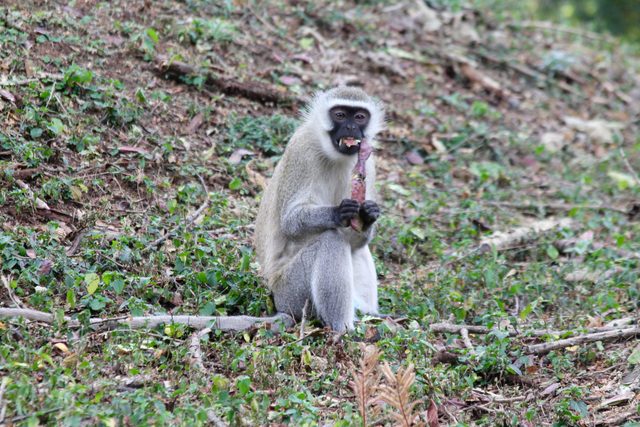
One of many vervet monkeys living on campus. Photo by Emma Lipkin.
Karibuni, friends! My name is Jessica, and I am a junior at Colorado College, studying Organismal Biology and Ecology. 15 students and I will be staying in and traveling through Tanzania this semester, studying Kiswahili, Ecology of the Maasai Ecosystem, Human Evolution, and Field Research Methods. We will be living with host families near Arusha and taking classes at MS-TCDC (Training Center for Development Cooperation) for the majority of our time here. We share the TCDC campus with people from all over the world, as well as with resident monkeys and huge, pterodactyl-like birds that we’ve learned are cranes. In addition to that, we’ll be spending about 5 weeks total in national parks such as Serengeti, Ngorongoro, Oldupai, and Tarangire, seeing the ecology and local tribes firsthand, and conducting our independent field projects!
On Monday, we began Swahili classes, and we’re all pretty proud of where we are now although we know we still have a LONG way to go. Currently, it’s a feat just to be able to hold a several-sentence conversation with locals. We begin learning about the ecology of the Maasai ecosystem next week and I’m extremely excited to begin learning about the environment where we will be living for several weeks!
Here are some of the interesting things that have happened this week:
By the time class was over on monday, we’re pretty proud of everything we’ve learned, which was about 15 different ways to say hello. After class, we went to get some more tea at the tea banda, a large, gazebo-like structure down the path from our classroom. Further down, is another banda where a group of artisans sell handmade jewelry, oil paintings, clothing, and figurines. This banda stands out well against the greenery around it because of the vibrant, bright colors of handmade trinkets and fabrics. One of the vendors is named Pascali, and he approached our group, immediately trying to converse with us in Swahili. Of course, it being our first day learning the language, he had us lost pretty quickly. The conversation went like:
Pascali: “Hamjambo (Hello all)!”
Us: “Hatujambo (Hello)!”
Pascali: (insert more advanced swahili phrases)
Us: blank stares
Turns out Pascali is one of the artists that does the oil paintings. He invited us to join him and paint in the sun sometime. But his rainbow-colored elephants and lifelike water buffalos are so beautiful that I would feel shy trying out oil painting with such an artist.
There have been quite a few language misunderstandings already. One of my classmates was trying to say that she is from America, which is “ninatoka Mmericani,” however she accidentally began the phrase with “ninatako,” Our instructor, Upendo, immediately stopped class, saying “No, no, no– you do not say ‘tako.’ You know what tako means? It means the thing that you sit on.” Upendo couldn’t stop laughing at this one.
Our field research methods professor, Ron, is also in our Swahili class–but as a peer. He always cracks up the class and our teachers with dad jokes, like calling an iPhone a “mimi-phone,” upon learning pronouns for the first time (“mimi” means “I”). Classes begin at 8:30 in the morning and end at 12:30, with a tea-time break from 10:00-10:30, so dad jokes are appreciated to break up the long hours. Even though I personally am used to long, intensive classes, coming from the Colorado College “block plan,” I still find it difficult to keep up with the quick pace of Swahili.
We met our host families on Tuesday afternoon. I’m staying with Mercedes, a student from Beloit College, and our household includes Neema (our host mama), her daughter Faith, and a bunch of chickens. Neema invited us to call her “Mama Faith.” Interestingly, in Tanzania, it would be incorrect to call her “Mama Neema”–the custom is to either call her “Mama + the name of her child” or just Neema. Or, because she calls us her “watoto” (her children), she could now technically be called “Mama Mercedes” or “Mama Jessica.” Mama Faith and Faith are both clearly well-versed in English, and entertain our elementary-level Swahili practice, by teaching us the names of all the dishes we eat at dinner, no matter how many times we forget them. After asking Faith simple questions like if she likes chickens (kuku) or bananas (ndizi), we tried and failed with more complicated communication. Mercedes brought out her frisbee and mimicked throwing it, trying to ask Faith if she liked to play, however, Faith took it, thanked us very sweetly, and put it in her room. Oops. Tanzanian families are clearly extremely hospitable, and Mama keeps asking us to eat more at meals even when we’re full. Concerned, she always tells us, “I want you to grow bigger like me!” Mercedes and I collectively are pretty small—she’s 4’10” and I’m 5’3”, so the food prepared is much more than we’re used to eating. Mama Faith likes to tell us, “I want you to live free here! Be free!” What she means is that she wants us to feel at home, but I like her wording better.
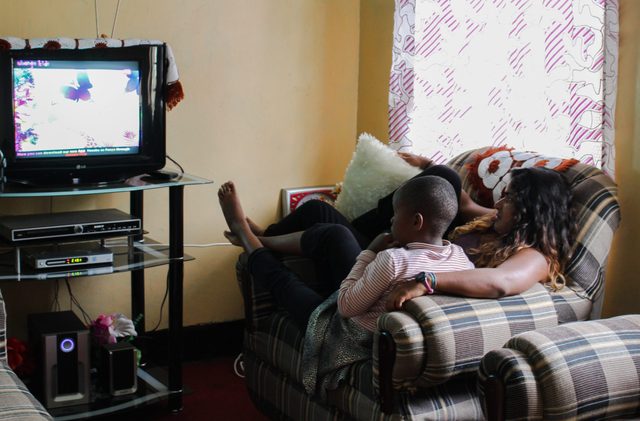
Mercedes and Faith enjoying Tanzanian cartoons about clean energy
At 4:00 a.m. on the first morning of our homestay, the kukus started crowing, and Mercedes and I both woke up, disoriented and confused. We were miraculously able to go back to sleep, but woke again at 6:00 when the rest of the kukus decided it was time for the humans to start their day. I’ve had chickens before but they were all only hens. What I didn’t know about chickens was that roosters begin crowing at the crack of dawn, and stop whenever they feel like it, which can be as late as dusk. After half an hour of attempting without prevail to rest more, Mercedes looked at me with dead eyes and said, “I could eat a chicken. I’m vegetarian, but right now, I could eat a chicken.” That pretty much summarizes how the rest of the exhausted morning went. Not everyone’s household has chickens, but all of the households are so close together that if yours lacks chickens–or has lazy chickens–the others around the compound can still act as an extra morning alarm. We’re all so grateful for the half-hour tea-time break in class, because the delicious Masala tea helps wake us up! I think we probably each drink an average of 6 cups of Masala tea per day.
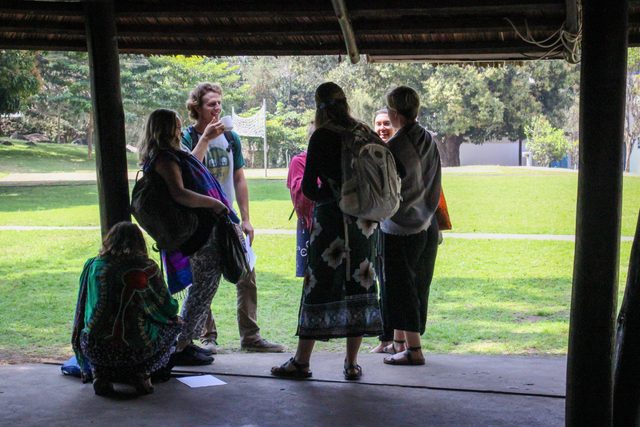
Enjoying chai (tea) at the tea banda
Wednesday morning, we learned how to say numbers, bargaining phrases, and various fruits and vegetables in Swahili. After just 3 hours of learning and trying to memorize these phrases, the class and our walimu (teachers) boarded a bus to the Tengeru market. The marketplace is definitely chaos upon arrival, to the untrained mzungu (white person/foreigner). The roads are lined on both sides with colorful wooden stands and vendors sitting on the ground under umbrellas. Dust clouds rise up around you from dala dalas (busses) and motorbikes that almost run you over. We made our way through throngs of people to find a good place to start practicing our bargaining “skills.” From all around us, vendors were calling out, “Hello! Karibu (welcome)!” When a couple of us finally approached a stand, the vendor smiled warmly, seeming very glad to have attracted customers. She proudly welcomed us and gestured to the fruits and vegetables she was selling. We stumbled over our greeting phrases and eventually learned that she was selling 5 cucumbers for 10,000 shillings—that’s about 5 USD. We shook our heads and recited freshly practiced phrases to bargain for a cheaper price: “Very expensive. We are students. We have no money.” After some back and forth, we finally got the price down to 7,000 shillings and felt very proud of ourselves. A few minutes later, we went to another cucumber-selling stand. Before we even asked how much they were, the vendors pointed to a bundle and said “3,000!” Turns out the other vendor had ripped us off a bit. Some of the vendors were not having it with the “we have no money” act. With one of them, I began saying, “I am a student,” and the vendor cut me off with “You are a student, you have no money, eh?” Clearly, she’s dealt with students before. Sheepishly, I said thank you and walked away. Another street vendor said to our group, “You have no money? Myself, I have no money! That is why I sell this!” The marketplace is an interesting dynamic, worlds different from quiet, tidy Trader Joes.
After the rush and clamor of the marketplace, we had lunch overlooking Lake Duluti, and then went for a peaceful hike around the lake with two rangers. Huge vines provided much-appreciated shade, hanging from the trees around us, creating green and brown tunnels over the paths. On the hike, the rangers pointed out interesting wildlife like the “kenge (monitor lizard),” and comorants, which are dark seabirds with long necks and sharp beaks. A lot of the path we walked on was made up of massive termite mounds over 6 feet tall! When Mercedes and I got home from the hike, we excitedly explained to Mama Faith what we’d seen. We couldn’t quite remember what the word for monitor lizard was, but we threw out a couple guesses and tried our best at describing it as a large, black-ish lizard that was named something like “kange.” She nodded her head and said that there was a “kange” living next door! Mercedes and I were shocked and ecstatic, as Mama Faith told us we could see it tomorrow. We asked how it was kept and how big it was and what it looked like, and Mama told us it just roamed in the backyard, was about a foot long, and that it looked like a chicken. Wait—a chicken? Turns out a “kange” is a large, black-ish, chicken-like bird that isn’t a turkey… and definitely not a monitor lizard. We’re still a bit disappointed that there isn’t a monitor lizard living next door, but we do still see them occasionally on walks to the supermarket.
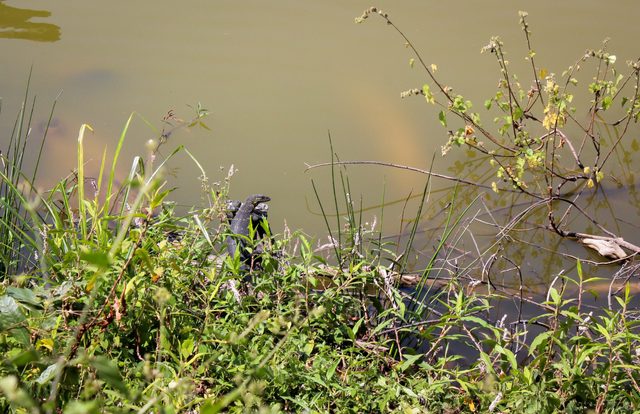
Lake Duluti: kenge, not kange
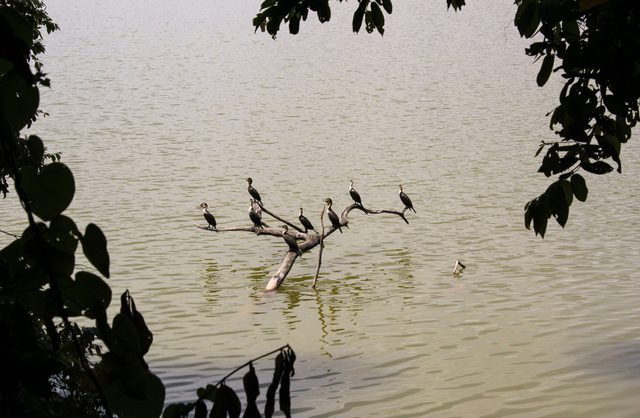
Lake Duluti: cormorants gular fluttering to maintain body temperature
On Friday, we all piled into a daladala to head to Arusha town. Daladalas are minibuses that serve as the main transportation system for Tanzanians. Finding one isn’t hard because more than 10 would drive by a point each minute, beeping at the people on the street to hop on. These buses aren’t very large, but they pack as many people as they can onto them, even if people have to sit on each other (that happened to us at one point). None of us are really sure how to navigate the daladala system yet–updates to come on this topic.
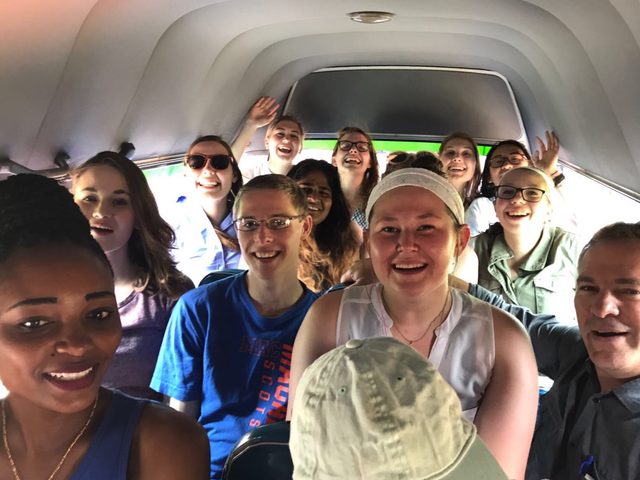
Daladala travel!
Upon arrival at Arusha, our large, mostly light-skinned group became a quick target for street vendors. Pro tip: the only way to escape the street vendors is to go into a legitimate store and hope they’re gone by the time you come out. Unfortunately, the street vendors were particularly interested in our group, being mostly made up of young females, and waited outside of stores to bombard us with questions and try to sell us stuff in rapid Swahili. With every question they asked, we politely smiled and said, “Hapana, asante,” which means “No, thank you.” Apparently we said it too much because they ended up naming our entire group “Hapana, asante,” and laughed at us for it, while also asking for our hands in marriage. Our teachers later told us that the vendors named us “Hapana, asante” because we said it even when they were just trying to ask us simple questions and not trying to sell us things.. our bad. Hopefully by the next time we visit Arusha, we’ll be a bit more well-versed in understanding quick Swahili. We’re already working on expanding our response vocabulary past “Hapana asante.”
Thank you for reading! More to come next week. Usiku mwema!